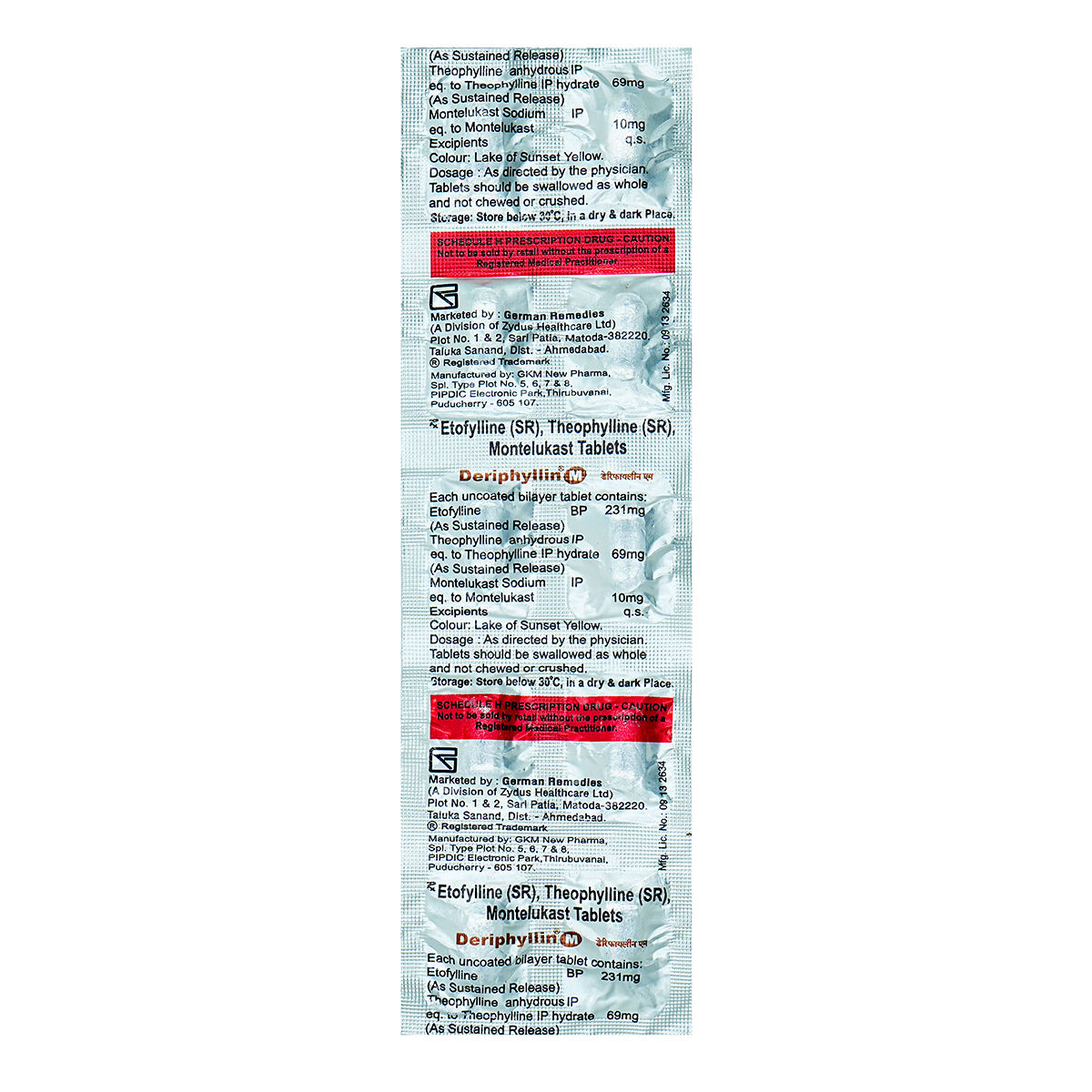Etofylline+montelukast+theophylline
About Etofylline+montelukast+theophylline
Etofylline+montelukast+theophylline is a combination medicine indicated for the treatment of asthma. Asthma is a respiratory condition in which airways narrow, swell, and produce extra mucus, leading to difficulty in breathing.
Etofylline+montelukast+theophylline contains Etofylline, Montelukast and Theophylline, which work by relaxing and widening the airways. This makes breathing easier. Thus, Etofylline+montelukast+theophylline helps treat asthma.
Sometimes, Etofylline+montelukast+theophylline may cause side effects like headache, nausea, vomiting, stomach upset, and diarrhoea. Most of these side effects may not require medical attention and resolve gradually over time. However, consult the doctor if the side effects persist or worsen.
Let the doctor know if you are allergic to any of the components in Etofylline+montelukast+theophylline. Consult the doctor if you are pregnant or breastfeeding. Keep the doctor informed about your health condition and medications to avoid unpleasant side effects/interactions.
Uses of Etofylline+montelukast+theophylline
Medicinal Benefits
Etofylline+montelukast+theophylline is indicated for the treatment of asthma. It contains Etofylline (bronchodilator), Montelukast (leukotriene receptor antagonists) and Theophylline (bronchodilator). Etofylline and theophylline work by relaxing and widening the airways; this makes breathing easier. Montelukast works by blocking the action of substances that cause asthma symptoms. Together, Etofylline+montelukast+theophylline helps treat asthma.
Directions for Use
Storage
Side Effects of Etofylline+montelukast+theophylline
- Headache
- Nausea
- Vomiting
- Diarrhoea
- Stomach upset
Drug Warnings
Do not take Etofylline+montelukast+theophylline if you are allergic to any of its components. Inform the doctor if you have/had gastric/peptic ulcer, infections, liver, kidney or heart problems, thyroid disorder, seizures, or psychosis. Consult the doctor if you are pregnant or breastfeeding. Let the doctor know if you are taking any other medicines, including supplements and herbal products.
Drug Interactions
Drug-Drug Interactions: Inform the doctor if you are taking antihypertensive (metoprolol), antacid (esomeprazole, pantoprazole) or other asthma medications.
Drug-Food Interactions: No interactions found/established.
Drug-Disease Interactions: Inform the doctor if you have peptic ulcer disease, seizures, renal dysfunction or neuropsychiatric disorders.
Drug-Drug Interactions Checker List:
Safety Advice

Alcohol
consult your doctorIt is not known if alcohol interacts with Etofylline+montelukast+theophylline. Please consult the doctor.

Pregnancy
consult your doctorLimited information is available. Please consult the doctor if you are pregnant or planning for pregnancy before using Etofylline+montelukast+theophylline

Breast Feeding
consult your doctorPlease consult the doctor if you are breastfeeding. Your doctor will decide if Etofylline+montelukast+theophylline can be taken by breastfeeding mothers or not.

Driving
consult your doctorIt is unknown if Etofylline+montelukast+theophylline affects your ability to drive. Drive or operate machinery only if you are alert.

Liver
consult your doctorLimited information is available on the use of Etofylline+montelukast+theophylline in patients with liver disease. Please consult the doctor if you have liver impairment/liver disease.

Kidney
consult your doctorLimited information is available on the use of Etofylline+montelukast+theophylline in patients with kidney disease. Please consult the doctor if you have kidney impairment/kidney disease.

Children
consult your doctorLimited information is available about the safety of Etofylline+montelukast+theophylline in children. Please consult the doctor if you have any concerns.
Habit Forming
Diet & Lifestyle Advise
- Include fresh fruits and vegetables in your diet. They contain antioxidants, which help improve lung health and prevent asthma attacks.
- Limit saturated foods by choosing lean meats and curbing fast foods.
- Manage your weight by maintaining a healthy diet.
- Choose a moderately intense physical activity and enjoy an active lifestyle.
- Quit smoking. It helps lower the severity of symptoms.
- Learn breathing exercises as they may help manage symptoms of asthma.
- Rest properly; get optimum sleep.
Patients Concern
Disease/Condition Glossary
Asthma: Asthma is a chronic (long-term) respiratory condition in which the airways narrow, swell, and produce extra mucus, leading to difficulty breathing. Symptoms include wheezing (a whistling sound while breathing), shortness of breath, chest tightness, and coughing, especially at night. Symptoms could be mild or severe and come and go over time. Causes include family history, allergies, lifestyle factors, and exposure to allergens or irritants.
FAQs
Etofylline+montelukast+theophylline is used to treat asthma, an inflammatory airway disease that causes breathing difficulties.
Etofylline+montelukast+theophylline works by relaxing and widening the airways. It also blocks the action of substances that cause asthma symptoms.
Even if you feel well, do not stop taking Etofylline+montelukast+theophylline on your own as it might cause worsening of symptoms. To treat your condition effectually, continue taking Etofylline+montelukast+theophylline for as long as your doctor has prescribed it. Talk to your doctor if you experience any difficulty whilst taking Etofylline+montelukast+theophylline.
Etofylline+montelukast+theophylline may not help treat sudden breathing problems. Consult your doctor; your doctor will prescribe a rescue inhaler to treat sudden breathing problems.

